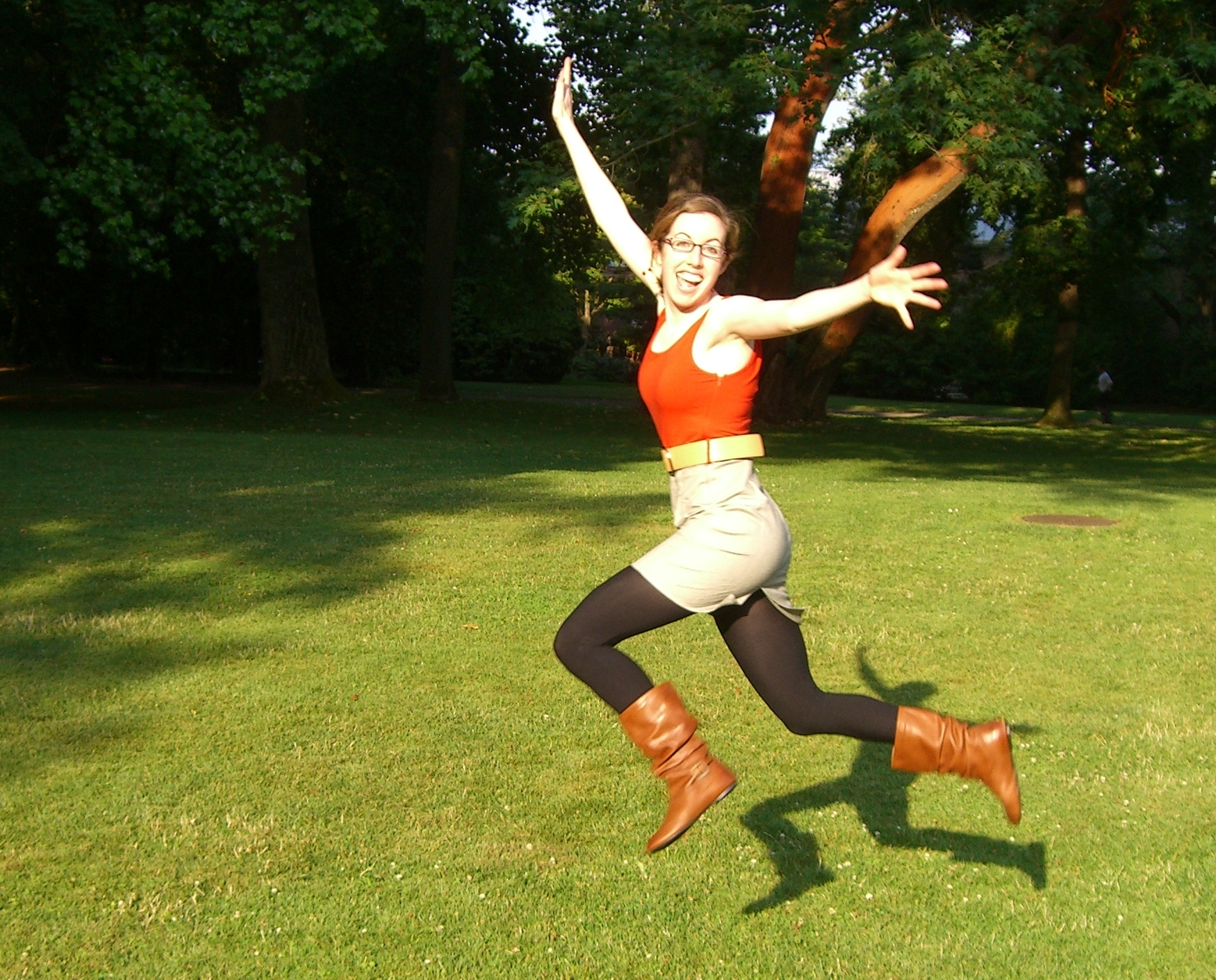My Biggest Wish for New Dancers: A Rational Optimism
After teaching beginning dance lessons for three years, I believe that one’s attitude is the most important factor influencing whether or not one sticks with the dance.

Let’s be brutally honest: learning to dance involves lots of mistakes and awkward moments. It’s an athletic and musical skill that is learned in the context of touching people that one might be sexually attracted to, for Pete’s sake!
In order to stick with it, you must accept some fundamental truths:
- You will make (MANY) mistakes.
- Along the way, your brain will want to attribute those mistakes to some causal factor.
- You will be the sole common denominator in all the mistakes you experience.
Given these facts, it’s no wonder that so many people assume they are “bad dancers” as they go through the initial learning phase! However, you have many choices regarding how to interpret your abilities and potential during each step along the way.
My one wish for new dancers is that they learn to form a more positive explanatory style during the learning process. This would help them stick with it and enjoy the (eventual) fruits of their labor!
Explanatory / Attributional Style

When you slip-up on the dance floor, do you automatically assume this means you are a terrible dancer, or do you see it as a temporary event that can be improved upon with time/effort? The choice of how to attribute the causes of events in your life is called “explanatory ” or “attributional style.”
Generally, people choose between interpreting such events as either global (happening all the time) or local (happening just one specific time), stable or unstable (changeable), and internally versus externally caused*.
For example, after having a bad or awkward dance, you can choose to interpret it as global (I’m a bad dancer), stable (I’ll always be), and internally caused (It’s all my fault), or you can interpret it as local (this particular dance was bad), unstable (I can do better next time), and externally caused (it’s not just my fault). The former explanatory style is sometimes referred to as “pessimistic explanatory style,” and the latter is often referred to as “optimistic.”
Explanatory Style and Task Persistence
The habitual way you attribute successes and failures to either yourself or other factors greatly influences whether or not you will stick with a given activity – a concept known as “task persistence.**”

So, if during the course of learning the dance you attribute all your successes to “dumb luck” and all your failures to the fact that you are a “sucky dancer,” you will likely not stick with the activity. If you adjust your explanatory style to include the possibility that you can/will improve, you will be more likely to persist.
It’s so easy to take the data of your initial forays into dancing and conclude lasting, stable, global characteristics about yourself, but I urge you to resist this temptation. Not only will it lead you to more frustration, guess what? It’s also dead wrong, from a logical standpoint.
The Icing on the Cake: Optimistic Explanatory styles are actually MORE rational
Here’s the thing with respect to learning dance: your brain might want to tell you that you’re a “terrible dancer” (global characteristic), you’re “never going to get better” (unchanging/stable), and you are solely to blame for your mistakes (internal causality of negative events). However, objectively speaking, you without a doubt do not possess enough data to support any of those negative conclusions!

You might have caused some mistakes, but an assessment of whether you are in a state of being a globally terrible dancer without any hope is without a doubt a question that only time can resolve. (Plus, it’s a partner dance, so it’s unlikely that you will be the sole cause of every mistake/awkward moment.)
Contrary to popular assumptions about what being “optimistic” might feel like, having an optimistic explanatory style does not mean that you believe you’re a globally/stable/unchangingly awesome dancer. In the context of learning a new dance, it can simply mean resisting the urge to apply any sort of global, stable label to your dancing until you’ve given yourself more time to stumble through the learning process.
I encourage people to see their dancing in more specific, unstable and changing terms.
“That particular move didn’t go the way I wanted it to” is a simple way to interpret a negative dance experience and is in fact more accurate than saying, “I’m a terrible dancer, I can’t do anything right, I’m never going to get better.” Even better, you can follow it up with, “Let’s try it differently next time.” You won’t know if you’re in fact incapable of improving until you attempt for a reasonable amount of time.
Conclusion
It breaks my heart to think that so many people have quit this dance after just one or two lesson series due to a premature assessment of their dancing potential. I do not endorse people being irrationally optimistic and thinking that they’re awesome in the absence of supporting data. However, in the specific context of learning a new skill, I believe you simply will not have enough data even within the first year of dancing to conclude whether or not you are a “terrible dancer.” The only rational option is to conclude that whatever state your dancing is in, it is temporary and susceptible to improvement.

To broaden the scope of this concept even more: it’s easy to look out at a crowded dance floor and presume that all the “good dancers” are innately talented (a “global,” pervasive, stable quality). However, although there are some prodigies among us, it is far more common that those who become advanced in any particular scene are simply the ones who have persisted doggedly through the learning process. For more on this, read Malcolm Gladwell’s Outliers.
I remember feeling a palpable sense of relief when, after one year of dancing, my instructor Mark Kihara admitted to the class that he struggled with the basic timing and footwork for over a year (and now, he’s a “rock star,” at least in my eyes!).
I’ve now taught long enough to see it for myself. Students who could not even clap on the beat much less step on it during the first 5-week series are now, 6 months later, confidently doing the basic steps out on the social floor.
My wish for all beginners is for them to use the power of their minds to help them persevere so that they can one day experience the infectious joy that is lindy hop / charleston / swing dance / jazz!
*For more on this, read up on “Attribution Therory.”
** For more on this, read this article: Persistence in a Putting Task During Perceived Failure: Influence of State-attributions and Attributional Style. DOI: 10.1111/j.1464-0597.2006.00249.x
No Comments
Pingback:
Bill Wong
Haha! I am guilty of thinking that I am not a good dancer a lot. When I attended OT conferences in the last two years, all I was hoping that I didn’t embarrass myself. After all, I didn’t know any popular dance tunes. Good thing to balance that out is that I also have part of my dad’s trait as a happy-go-lucky person as well. One thing he is absolutely terrible at is singing. Yet, it doesn’t stop him from singing- whether it’s by himself at home or at church. So, I carried that with me on the dance floor. In the end, I still had a good time. That’s what matters most.